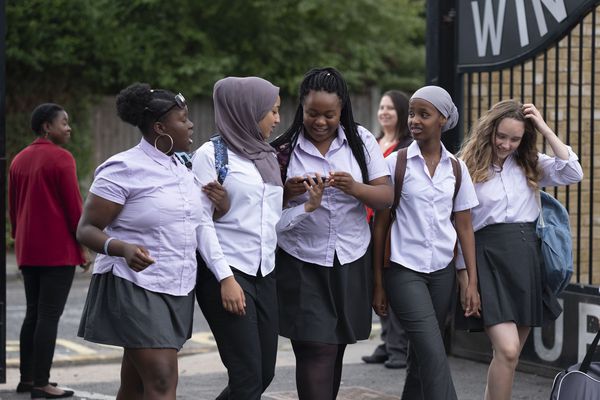 |
| Bukky Bakray, centre, as Rocks. Theresa Ikoko: 'It was really a story about sisterhood and appreciation and the transformative power of that' Photo: Courtesy of San Sebastian Film Festival |
Sarah Gavron's Rocks charts a week in the life of her resourceful teenage protagonist Shola, aka Rocks, (Bukky Bakray), who tries to hide the situation from the authorities after her mum abandons Rocks and her younger brother Emmanuel (D'angelou Osei Kissiedu) due to depression. The film is co-written by playwright-turned-screenwriter Theresa Ikoko, partially in tribute to her own sister, alongside TV writer Claire Wilson (The Little Drummer Girl). The result - which is screening at London Film Festival this week - is a feisty immersion into the lives of modern-day London teenage girls as Rocks turns to them for support, even as her attempts to protect Emmanuel begin to crumble.
There's a dedication at the end of the film to the young cast, who helped Ikoko and Wilson develop the characters and the script and when we caught up with Ikoko and Gavron at San Sebastian Film Festival last month, we talked about the development of the project and the societal changes that led to Ikoko tackling the subject in the first place in the first part of a two-part interview.
You worked a lot with the cast in developing the script, so can you tell us a bit about the way that process worked?
Sarah Gavron: Yes, so we began with the idea of wanting to make a film about young people and young women specifically because we both and many of the team grew up in London. We grew up around these women but we don't see them on our screens often. So it was a very open brief. But we decided that instead of coming up with the story and script first and then trying to find people to fit it, that we would go out and find our cast first and build it with them and around them. So that process was begun with a really excellent woman called Lucy Pardee, who's a casting director, who has worked in that way before with Andrea Arnold. Not quite in that way, but she's done a lot of street casting and she worked with another woman called Jessica Straker and there was almost a year's period of finding young women who wanted to take part in it and then doing a workshop process with Theresa and her co-writer Claire Wilson, and all of us building it. It was really when Theresa made the connection with Bukky, who plays Rocks, and we were looking for a storyline. And she can tell you how that evolved.
Theresa Ikoko: Claire and I had started working on a script that wasn't quite right - it didn't feel like it really honoured what was happening in the space and we didn't feel like it reflected it accurately. So we went back to the drawing board and I started working on a story that I described as a love letter to my sister. To honour my sister and other black women who I thought had to be really strong but had these soft centres of joy and love that I wanted to celebrate. It was really a story about sisterhood and appreciation and the transformative power of that. And looking at what was happening in the rooms during the development of Rocks, it felt like that story was the perfect foundation to build something on. Claire responded in a way that I wasn't expecting, she related to and connected with it in such a way that a story that I thought was for black women and by black women and it suddenly felt that a story I thought was for one woman was for all women. We took it to the girls scene by scene and every scene they had anecdotes and laughter and banter and lines even. And it grew into something a lot bigger. Now I describe it as a love story for 100 women by 100 women for 100 more women.
Could you elaborate a bit about the influence of your older sister - does that mean you were a bit like the Emmanuel character?
 |
| Theresa Ikoko and Sarah Gavron in San Sebastian Photo: Courtesy of San Sebastian Film Festival/Montse Castillo |
Is the scaffolding being gone a new thing?
SG: I grew up much earlier than Theresa because I'm quite a lot older, so I saw a change from having quite a lot of youth provision, relatively, and then it being stripped away and the damaging effects of that now we are seeing manifest themselves. So, initially, it was just about cuts to youth services and now, literally, there are no youth clubs any more. There are no places for young people to go. Also as Theresa has pointed out this relatively new policy of just excluding kids, partly to reach standards that people are being asked for in schools and partly just to ignore the problem - and then there aren't enough places to take those kids.
So really it feels to me like, in the last 10 years, there's been a significant downward shift. But what was so wonderful about working with this team and Theresa's particularly connected with young people, then going into schools and meeting our cast, was how despite those circumstances, these girls are resilient, they're navigating the world tenaciously, they've got hope and they've got masses of potential. And we feel that even in the process of making the film, it wasn't just for us about the end product - although that's obviously very important - but it was also about providing an environment for these girls to fulfil their potential. In a way that extended, as Theresa said, to all the women around the film. We wanted to build a structure and make the film in such a way that, in itself, hopefully, led to more positive things happening for all the people involved in it.
How do you pick who is the lead after the workshops?
SG: They felt protective and they loved Bukky and they formed an admiration of her for all those qualities that Theresa spoke of and because she really stretched herself in the workshop process and went the extra mile and they were all in awe of what she was doing from an acting and improvisation point of view.
TI: We learnt early that you could say to Bukky, 'Try more. Give a little more'. And she would think about that and she would do it. She told us only recently, that she went home one day after a workshop and said to herself, 'Maybe I could do this'. Then she came back the next week and she gave a performance that blew our socks off. We were just having fun and she came in to work and that was it.
Has your sister seen the film?
She saw it in Toronto for the first time. I kept it away from her until then. My sister is like Bukky, quite tough and quite cool... and she cried, so I was, like, 'Yes!'
And what are your plans now?
TI: To keep making films exactly like this in the exact same way because I don't see why you should have to do it any other way apart from doing it surrounded by people who you love, who love the world you are creating and would give absolutely anything for it. And we're going to keep at it.
The film will be released in UK cinemas on April 10, 2020.
In part two, we talk to Gavron and Ikoko about the challenges on set and the ongoing push for diversity in films






















